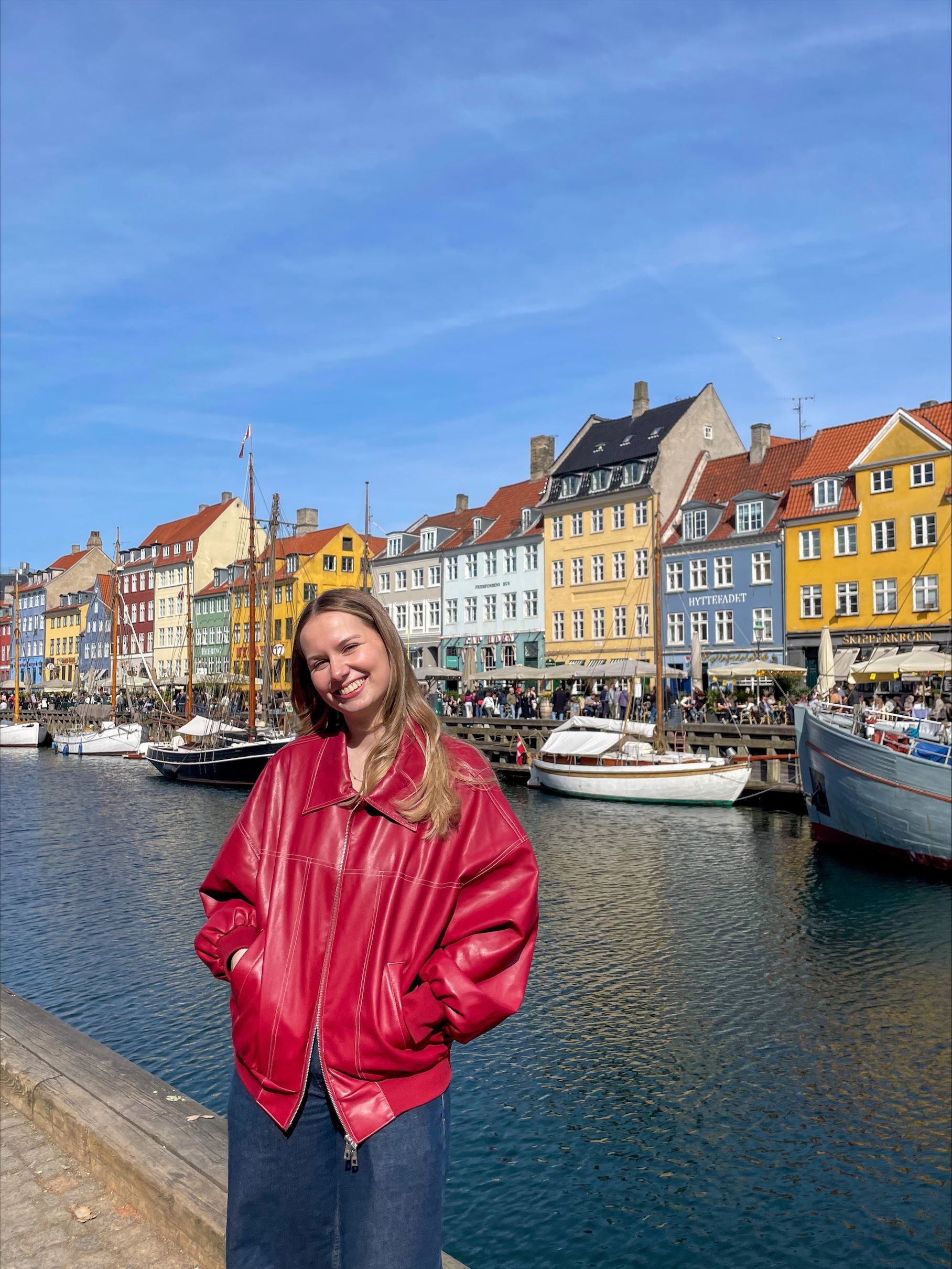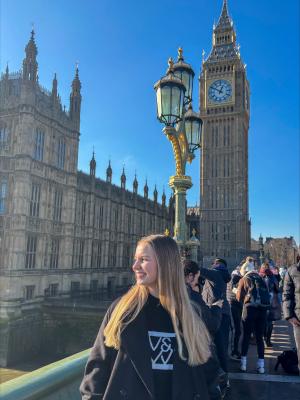Motivation
I have always wanted to travel and live somewhere other than Australia. Before going on exchange, I had never been to Europe and I had never solo travelled. Studying in London offered me the opportunity to immerse myself in the deep and rich history of the UK, whilst also allowing me to explore other countries due to its proximity to the rest of Europe. Choosing to complete an exchange with UCL, I was excited to learn from one of the most renowned universities in the world, gain a global perspective on the increasingly relevant engineering challenges our world faces, and make new lifelong friendships.
Personal Development
The greatest things I have gained from exchange are lifelong friends and a deeper desire to travel more of the world. I was really lucky to form so many friendships whilst overseas, including from my flat, my courses, the societies I joined, the events I attended, and the people I met travelling. I feel so fortunate to now have friends all over the world in countries such as the U.S., Italy, Chile, Germany, Brazil, Singapore, Korea, and Colombia. Now with all of us back home, I have reasons to travel more of the world and experience their cultures through the eyes of a local. Ultimately, it is these friendships that have helped strengthen my confidence, adaptability, and broadened my world view. 
Academic Development
As UCL is one of the best universities in the world, I was extremely excited for my classes but also nervous about their difficulty. I enrolled in three postgraduate chemical engineering electives and one final-year chemical engineering course: Energy Systems & Sustainability, Sustainable Water Resource Management, Electrochemical Engineering & Power Sources, and Advanced Safety & Loss Prevention.
Overall, I found the coursework and course load at UCL to be less demanding than that of UQ. Unlike UQ, where I am used to weekly pieces of assessment, UCL splits its assessment into just two assignments and one final exam with no hurdle requirements. The class structure is also very different, with only lectures and some tutorials and no workshop-style classes. The three postgraduate courses I took also had very small cohorts equivalent to that of a high school class. This fostered more interaction with our professors and allowed for more in-depth discussions. They do monitor attendance by tapping in with your ID card in the lecture halls, so attending lectures in person is more prevalent than watching online, which I often do at UQ. But this was also a pro in terms of meeting more students and better engaging with the professors. My strong interest in the courses I selected and their advanced content as postgraduate electives also motivated me in my coursework. This is because I thoroughly enjoyed the content and technical class discussions that were led by our professors, who actively work in the world's leading research teams for their related courses and or have worked at the head of relevant engineering organisations.
Professional Development
One of the biggest lessons I learnt from my exchange was remaining confident in my own abilities in the face of impostor syndrome. Moving to the other side of the world without knowing anyone can be a daunting experience that makes you question your own skills. This didn’t only apply to my academic knowledge in attending such a renowned university, but also the problem-solving and communication skills that are required from undertaking such a move. It is from pushing myself out of my comfort zone and into that unfamiliar environment that made me realise I already have these strong skills and only need to trust myself when challenged. Moreover, I believe how I have flourished at such a prestigious global university demonstrates my ability to thrive in a diverse and challenging global setting, increasing my professional development.
Costs and Budget 
London is one of the most expensive cities in the world, so it’s important to decide in advance what you want to prioritise when it comes to spending. For me, I knew I wanted to travel a lot as I have never been to Europe and I wanted to explore both the UK and other countries. Thus, to keep my day-to-day living expenses to a minimum, I chose to stay in a twin room as this was the cheapest accommodation option available. I also shopped at Lidl for groceries, rarely ate out, and walked as much as possible to avoid catching the tube or bus. Whilst it is expensive, London also has lots of student discounts available. I took advantage of meal deals, the TooGoodToGo app for discounted groceries and meals, and had a Railcard for reduced transport fares. This helped me to minimise my daily expenses so that I could allocate more of my budget to travel.
Over the course of my exchange, I spent approximately $22,000, including the funding I received from IGET. However, I travelled extensively, visiting 12 countries in the time I was there. This included travel on the weekends, during our 1-week reading break, 1-month spring break, and 4 weeks at the conclusion of my semester before returning home. Whilst I stayed in hostels during this time to save money, I visited lots of other expensive countries such as Norway and Denmark and prioritised activities and eating out whilst travelling to immerse myself in different cultures. Thus, a lot of my money was spent on travelling rather than on my living expenses in London. It is also important to note that train tickets to the airport and other places in the UK are expensive and would often cost just as much as the flight ticket. It is very feasible to spend much less if you aren't looking to travel a lot while overseas.
Funding
The funding I received from the IGET Grant was extremely valuable, allowing me to pay for my flights there and home without using savings I had set aside for living expenses. This took some pressure off making such a big one-time purchase.
Accommodation
I received housing through UCL by applying through their accommodation portal. As I was conscious of prioritising money for travelling, I applied for a twin room as my first preference. I ended up staying in a twin room in Campbell House West, one of the student halls, for £154.77 a week. The location was perfect for me as it was only a two-minute walk from my classes and was close to two different tube stations on different lines. Whilst being very central and walking distance to the sights, the Bloomsbury area is a quieter suburb with lots of green spaces and cafes.
In my flat, I shared a room with one other person, as well as a kitchen and three bathrooms with eight other flatmates in total. Even though this might seem a bit cramped, the kitchen was spacious enough for several to cook at once and use as a common social area for us and our friends. Although my hall was less social than others, mostly when it came to meeting people outside your flat, and didn’t have its own reception and laundry room (which were located in Campbell House East across the street), this didn’t cause any issues. Some of my friends who weren’t able to secure UCL accommodation stayed in Unite Students housing, which is a good alternative. However, I do recommend trying to receive UCL accommodation as it is more affordable, generally more social, and a more ideal location.
Highlights 
It’s hard to pick only a few highlights but some of my best memories were made having food and drinks on my friend’s rooftop, celebrating birthdays at Primrose Hill, and solo travelling around Italy, France, and Croatia for 4 weeks at the end of exchange.
Top Tips
My advice to anyone is to go to every university event and embrace feeling uncomfortable. Whenever I was uncomfortable, I knew I was doing something to push myself and it always resulted in something positive. By going to every university event and joining different societies, you are pushed to meet new people. I made my closest friends in the first week of exchange by attending university speed friending dates where you explore London. Whilst at the time it sounded terrifying and awkward, it was events like these that introduced me to lifelong friends. At UCL, they have an online What's On calendar and this was what I used to find events. I also think saying yes to everything is important because 6 months will fly by and exchange is a once-in-a-lifetime experience. In the first few weeks, I was invited by a friend group to travel with them to Norway. I almost said no because I didn’t know them that well and didn’t know much about the country, but it ended up being one of the best trips.


